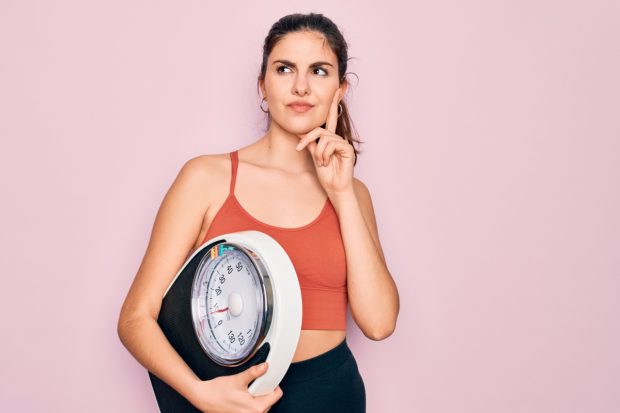Wondering why you’re not losing weight? Turns out, you could be working out too much!

Eating healthy? Check. Regular sweat seshes? Absolutely!
No matter how hard you try, it seems that the pounds are clinging on. It’s frustrating to say the least. But if you’re determined to make a breakthrough, here’s science-backed research to pinpoint the reasons why you’re not losing weight despite working out regularly.
#1: You’re Losing Fat But Gaining Muscle

One of the common misconceptions about weight loss is that the pounds will just fly off. That’s not exactly true.
When you’re working out, your body is doing two important things: 1) You’re burning stored fat, and 2) You’re building muscle. Muscle adds weight to the body, but in a really good way! And the more muscle you have, the easier it is to burn fat, even long after your workout is over.
Related: Why Lifting Weights Won’t Make You Bulky
To get an overview on what’s happening with your body, measure your hips and waist at the start of your weight loss journey.
Then, do regular checkups as a guideline for how much fat you’re actually losing. This is a good indication of how much muscle you’re gaining and fat you’re losing.
So, don’t be alarmed if you initially see the scale going up or staying stagnant—it’s a sign that you’re building muscle and losing fat.
#2: You’re Intaking More Calories Than You Realize

Do you know how much you’re actually eating? It might be beneficial to use a food journal or a tracking app as guidance. When you’re trying to lose weight, it’s very helpful to document everything you eat throughout the day.
You might soon realize that you’re consuming quality foods but you’re simply eating more than you should. Too many calories, no matter the quality of the food source, can lead to stalled weight loss.
As a simple rule, to lose weight you must burn more calories than you consume. So, if you consume more calories than you burn, anything in excess is stored as fat, causing weight gain.
Your goal? Consume fewer calories than the amount you’re burning.
#3: You’re Not Consuming Quality Foods

A recent study found that if you remove refined carbohydrates, added sugar and processed foods from your diet, you’ll lose significant amount of weight.
The weight loss among participants came from eating more vegetables and whole foods without limiting portion sizes or counting calories.
And notice, the study didn’t say to remove carbs—it’s the types of carbohydrates you choose that make all the difference. Always choose complex carbs, like whole-wheat pasta, brown rice and whole grains over refined carbs that have been stripped of their fiber, like crackers, chips, sugary cereals and baked goods.
So, for those of you who are exercising on the reg but not seeing the weight loss results you’d hoped for, take a look at the quality of food you’re consuming.
Related: The Real Truth on Protein, Fats and Carbs
#4: You’re Not Getting in the Right Type of Exercise

You’re exercising 6 days a week but you’re not seeing the weight loss results you want. Ask yourself what type of exercise you’re doing?
To lose weight, you should do a combination of cardio and strength training. And even if you don’t want to build muscle mass, strength training will tone your muscles, which drastically enhances weight loss.
But at the same time, you want to burn calories. Strength training alone won’t be enough. That’s where cardio workouts come into play. I’m not talking about steady-state cardio on a treadmill or stationary bike. I’m referring to high-intensity interval training (HIIT), which is scientifically proven to burn significantly more fat than steady-state cardio.
#5: You’re Working Out Too Much

I totally get it—how can a regular exercise routine make you gain weight? One reason is that people tend to eat more when they work out, either because they feel that they’ve earned it or because they’re overestimating how many calories they’ve actually burned.
The second reason is that working out makes you retain water. Your body is a wonderful thing—to ensure you don’t get dehydrated, it stores plasma in your bloodstream, which adds up to 4 pounds of water retention. It’s important to note that it’s not fat or muscle, it’s simply superhydration.
And by no means should you stop drinking water after reading this. Keep working out, stay well-hydrated and refrain from jumping on the scale after every workout.
Most importantly, shift the way you think about exercise. It should be about how you feel instead of how much weight you’ve lost. After all, that shift on the scale is you gaining muscle, which is a good thing since muscle burns fat faster.
Beyond the Numbers
When the scale doesn’t reflect all the hard work you’ve been putting in, gauge your success in other ways. Ask yourself how do your clothes fit, how do you feel and how much can you do? Long-term success comes from a balanced approach to your health, not a quick fix approach, so exercise consistently and intake quality foods to see long-term results.
Looking for the perfect fitness and nutrition plan for your individual needs? Start your 7-day free trial with Gymondo and find 100s of workouts and 1000s of recipes made with you in mind.




Kommentar schreiben